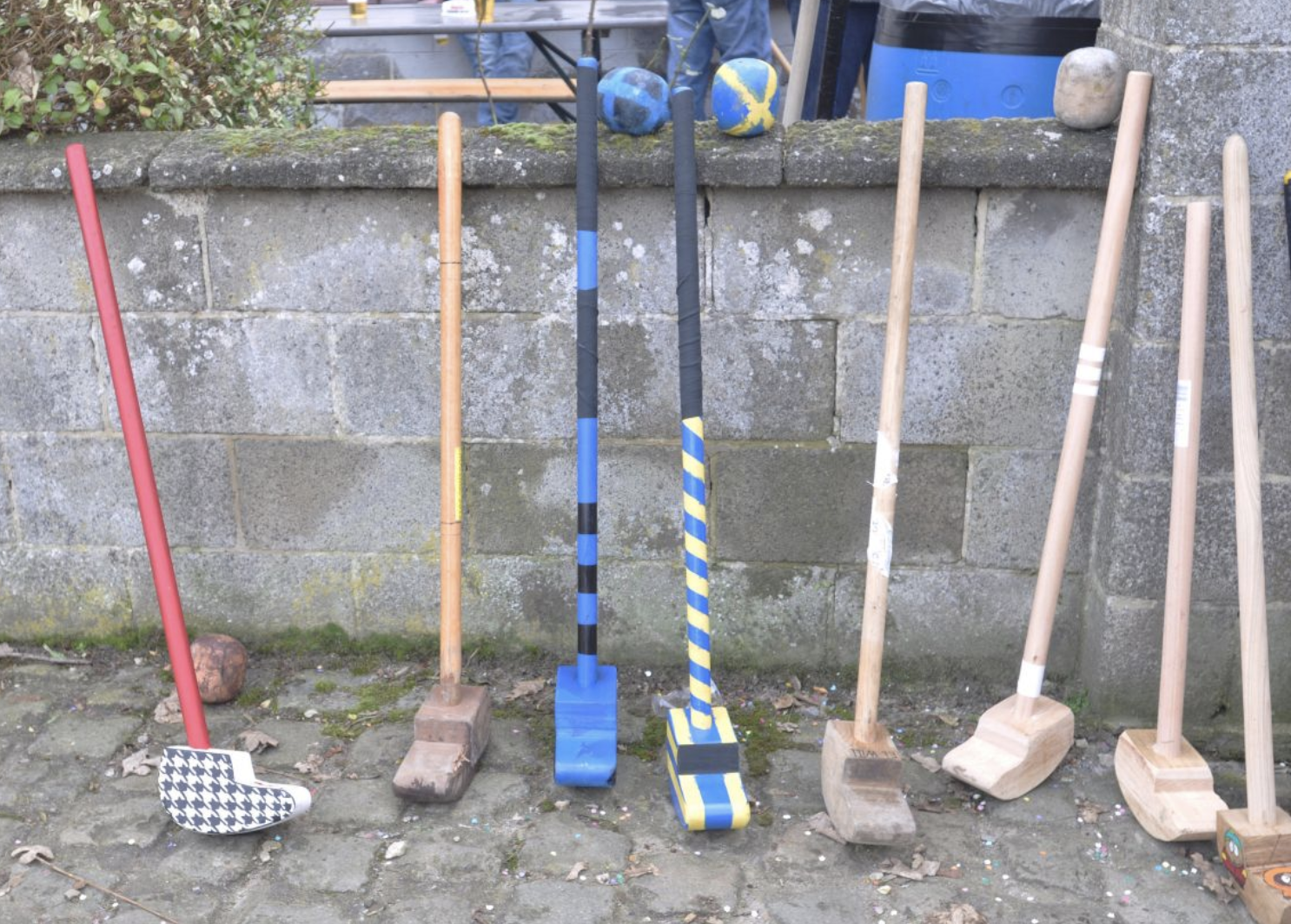
Mallets or, as they are called in the game of crossage, rabots, may be decorated according to its players whim.
Crossage reopens in Chièvres with some health measures
By the USAG Benelux Public Affairs Office
CHIÈVRES, Belgium – In Chièvres, crossage is a must-see event! This year, it will take place March 2, in the heart of the city.
Due to the COVID-19 pandemic, this year's event will look different. In Chièvres, 800 people will be able to participate in the game. Only the participants will be authorized to access the event. Also, the presentation of your COVID Safe Ticket with your ID will be requested before entering "the game zone."
If it is your first time, the most important rule is to learn those two words: "attention chôlette." During the event, participants play on the street with a wooden mallet called a "rabot" and a wooden ball called a chôlette. Teams compete against each other as they hit the chôlette with their rabot to reach beer kegs in as few hits as possible. Players shout "chôlette" before they strike the ball to warn other players that the ball is in play.
The game can be compared to croquet or golf. The entire course covers 30 beer kegs. Teams compete against one another and have to announce a number of hits to touch the keg.
The rabots are handmade with a very specific technique. Players can customize their rabot as well as the wooden ball. There are no rules concerning rabot. Everyone can decorate their rabos and chôlettes. It is recommended that people soak their rabots and chôlette in water overnight and let them dry before decorating them. This will help prevent the wood from cracking while playing the game.
In Chièvres, participants play “crossage à l’tonne” (tonne meaning keg) in the streets. It is one of the different forms of crossage. The sport has evolved over the years, and there are several explanations about its appearance. The history of crossage dates back to the Middle Ages. Initially, this game was for nobility In the early 15th century, they were playing within the city fortifications. In the 18th century, participants had to play in the fields as the game was causing too much damage inside the city. Then, the game came back to the streets for Ash Wednesday.
Many players participate in the annual event first and foremost to have fun with their friends. Participants try to hit kegs in front of local bars. There are not many bars left today so people place temporary bars instead. At the end of the game, the losing team must buy beers for the winning team. Drinking beer may seem contradictory, because March 6 is the first day of Lent. At the time, Non-Christians wanted to play, party and drink during Ash Wednesday to challenge the Church. It was a provocation and a way of reacting to the obligation of fast and abstinence. Due to the COVID-19 pandemic, participants will have to be sitted while drinking or eating.
If you want to attend the event, remember that several players can hit a ball at the same time in different directions. Watch your surroundings to avoid being hit! The city of Chièvres will be closed to all traffic. No parking will be allowed as this game is played on the streets.
The City of Chièvres loves to see our community take part to this tradition, so there are some spots for our community. If you want to make sure to get one, swing by the by the Public Affairs Office (building 20005 on Chièvres Air Base) between 8 a.m. and noon Feb. 11!
If you miss the deadline, you will still be able to register at the Tourism Office of Chièvres City as of Feb. 14, but only as long as they still have spots available.
The participation fee to be paid at registration is 10 euros and includes the insurance, a mask and a bracelet for the entrance. You will have to wear your mask for the entire duration of the event.
If you don’t have your material (wooden mallet and chôlette), please call DSN 597-5250 or civilian +32 (0)68.25.5250 or +32 (0)496.876938.




